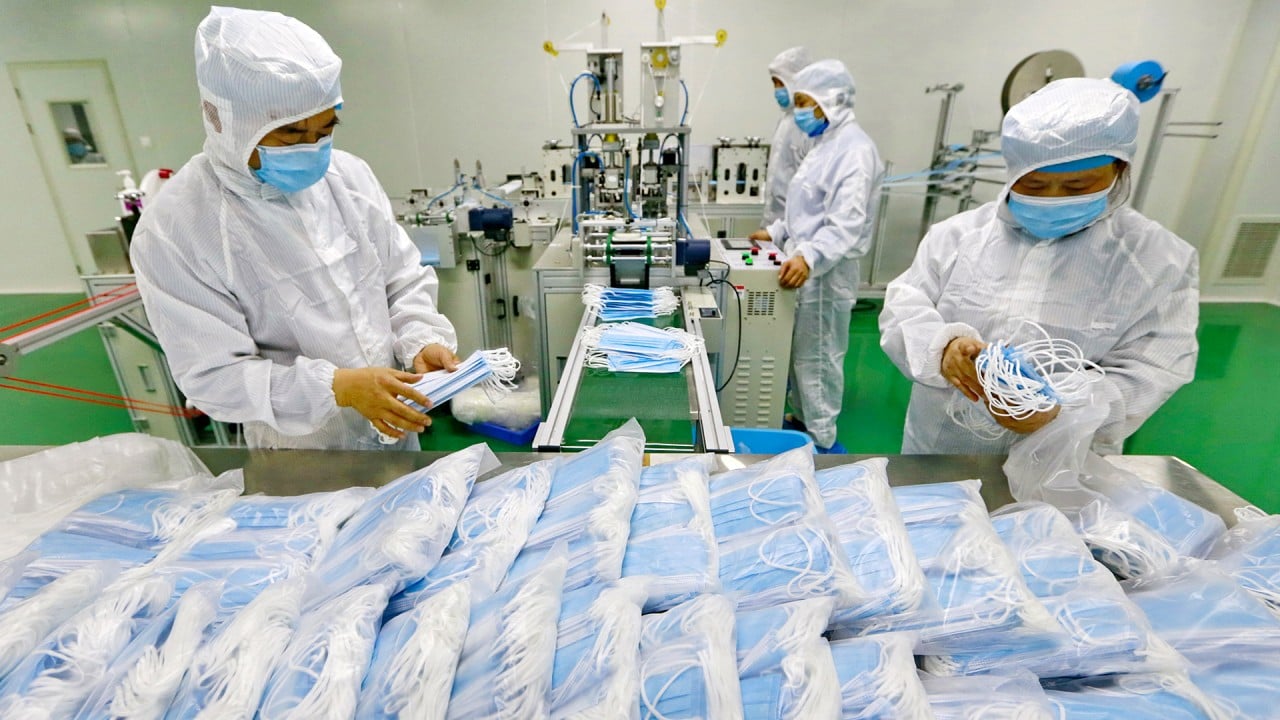
As the US retreats in a coronavirus-ravaged world, China is increasing its influence on the world stage
- In recent years, the US has been withdrawing from the international system, while China has been taking on a greater role. Covid-19 has heightened this trend, with China’s pledges of assistance standing in stark contrast to American isolationism
He looks to be keeping his word. Beijing has now publicly pledged that an effective coronavirus vaccine will be available by the end of 2020; it has also committed to providing the vaccine first to more than a dozen countries, particularly emerging nations that it has close ties with, including Brazil and Indonesia.
This is just the latest in a series of actions that China has taken to position itself at the forefront of the worldwide response to the virus, and which stands in contrast to the United States’ isolationist stance.

01:39
Face mask shortage amid coronavirus pandemic reminds world of China’s manufacturing dominance
When the first plane loads of protective gear from China arrived in Belgrade, accompanied by Chinese medical professionals, Serbian President Alexander Vucic publicly kissed the Chinese flag in gratitude.
It is notable that the US is withdrawing from the international system that it did so much to create in the aftermath of World War II. This included not just institutions like the United Nations and World Bank, but also the provision of global public goods, such as promoting public health, ensuring freedom of navigation and, more recently, the guardianship of cyberspace. By underpinning these efforts, the US has been able to more or less dictate the international agenda.
Not any more. As the US has withdrawn to within its borders, it has created a vacuum into which China has surged. Apart from Covid-19, nowhere is this more obvious than at the United Nations.

Despite being the UN’s major funder, accounting for around a fifth of the overall budget in 2018, the US has in recent years taken against the organisation, partly out of annoyance that it hasn’t always had its own way there. China, on the other hand, has pushed hard to make its presence felt, even if monetarily it contributes just a fraction of what its rival does. Chinese citizens now head four of the UN’s 15 specialist agencies, compared to just one by the US.
16 billion doses of Covid-19 vaccine forecast, but delivery a challenge
It has the same approach to aid: research has shown that countries which vote in the UN in alignment with China receive significantly more aid from Beijing than those that don’t, a trend that looks set to be reinforced by China’s forthcoming vaccine distribution.

03:21
US-China tech war: Tumultuous times for Huawei - can it survive?
Backed by billions of dollars’ worth of loans and grants, the digital silk road has opened the door for companies like Huawei and ZTE to dominate the domestic markets of swathes of the emerging world. This in turn allows these firms to control much of the data flow there, and by doing so they can understand the markets better, thus more effectively identifying and eliminating competitors.
The advantages of China’s multilateral investment are clear, as are the downsides to the US’ isolationist approach. “The US is withdrawing from multilateralism to our great regret, and the Chinese are moving in,” said Hans Blix, the veteran Swedish diplomat.
China’s pandemic success is failing to boost its regional reputation
Many in the West hope that a win for Democrat candidate Joe Biden in November’s presidential election will see American re-engagement with the world, but that is not guaranteed. Although Biden has promised to “restore American leadership” internationally, domestic pressures are likely to take precedence.
The pandemic has done much to tip the scales away from US dominance of the international agenda, perhaps for good. It will be one of this period’s greatest ironies if Trump’s isolationist policies during Covid-19 mean that China is remembered not for what the American president has called the “Chinese virus”, but for its internationalist response to the crisis.
Sam Olsen is the co-founder of the strategic consultancy MetisAsia and a commentator on Chinese-Western relations

